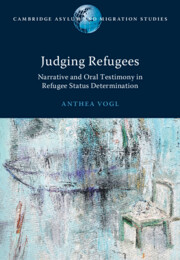Book contents
- Judging Refugees
- Cambridge Asylum and Migration Studies
- Judging Refugees
- Copyright page
- Contents
- Foreword
- Acknowledgements
- Abbreviations
- 1 Introduction
- 2 Law, Literature and Narrative in the RSD Oral Hearing
- 3 How Did We Get Here? A History of the Oral Hearing in Australia and Canada
- 4 The Stock Narrative of Becoming a Refugee
- 5 Narrative Contest as Structuring the Oral Hearing
- 6 ‘I’ll Just Stop You There’: Fragmentation of Refugees’ Oral Testimony
- 7 Beyond the Demand for Narrative: Genres of Refugee Testimony
- 8 Conclusion
- Appendix
- Index
4 - The Stock Narrative of Becoming a Refugee
Published online by Cambridge University Press: 15 March 2024
- Judging Refugees
- Cambridge Asylum and Migration Studies
- Judging Refugees
- Copyright page
- Contents
- Foreword
- Acknowledgements
- Abbreviations
- 1 Introduction
- 2 Law, Literature and Narrative in the RSD Oral Hearing
- 3 How Did We Get Here? A History of the Oral Hearing in Australia and Canada
- 4 The Stock Narrative of Becoming a Refugee
- 5 Narrative Contest as Structuring the Oral Hearing
- 6 ‘I’ll Just Stop You There’: Fragmentation of Refugees’ Oral Testimony
- 7 Beyond the Demand for Narrative: Genres of Refugee Testimony
- 8 Conclusion
- Appendix
- Index
Summary
This chapter argues that a distinct stock story of who refugees are and how they behave, which it describes as the ‘stock narrative of becoming a refugee’, featured throughout the hearings. This stock story is one version of how, when and why ‘genuine’ refugees decide to leave their home countries and seek refugee status in another state. The chapter analyses the extent to which this prescriptive narrative conforms with international and domestic definitions of refugee status, to show that the normative expectations embedded within the stock tale far exceed the legal basis for refugee protection. Nonetheless this story, with its distinct narrative form, was demanded of refugee applicants during oral hearings and structured how decision-makers tested and judged applicants’ evidence and credibility. While decision-makers frequently demanded evidence that conformed to the stock narrative of authentic refugeehood – or that applicants to account for deviations from this narrative – refugee applicants also implicitly or explicitly contested or resisted this demand when presenting their oral testimony.
Keywords
- Type
- Chapter
- Information
- Judging RefugeesNarrative and Oral Testimony in Refugee Status Determination, pp. 66 - 89Publisher: Cambridge University PressPrint publication year: 2024

